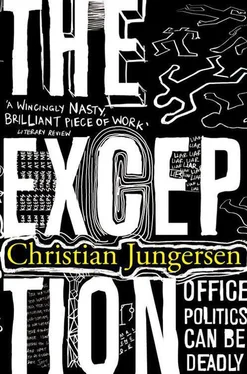Christian Jungersen - The Exception
Здесь есть возможность читать онлайн «Christian Jungersen - The Exception» весь текст электронной книги совершенно бесплатно (целиком полную версию без сокращений). В некоторых случаях можно слушать аудио, скачать через торрент в формате fb2 и присутствует краткое содержание. Год выпуска: 2010, Издательство: Orion Books, Жанр: Современная проза, Триллер, на английском языке. Описание произведения, (предисловие) а так же отзывы посетителей доступны на портале библиотеки ЛибКат.
- Название:The Exception
- Автор:
- Издательство:Orion Books
- Жанр:
- Год:2010
- ISBN:нет данных
- Рейтинг книги:3 / 5. Голосов: 1
-
Избранное:Добавить в избранное
- Отзывы:
-
Ваша оценка:
- 60
- 1
- 2
- 3
- 4
- 5
The Exception: краткое содержание, описание и аннотация
Предлагаем к чтению аннотацию, описание, краткое содержание или предисловие (зависит от того, что написал сам автор книги «The Exception»). Если вы не нашли необходимую информацию о книге — напишите в комментариях, мы постараемся отыскать её.
The Exception — читать онлайн бесплатно полную книгу (весь текст) целиком
Ниже представлен текст книги, разбитый по страницам. Система сохранения места последней прочитанной страницы, позволяет с удобством читать онлайн бесплатно книгу «The Exception», без необходимости каждый раз заново искать на чём Вы остановились. Поставьте закладку, и сможете в любой момент перейти на страницу, на которой закончили чтение.
Интервал:
Закладка:
‘None of this was reported in the papers, of course, but the stories kept coming. They’d always begin with something like “Have you heard what they’re saying about Mirko? That he …?” Even then the talk was about the kind of crimes he’s now being charged with at The Hague. He was said to have asked for camp duty purely for entertainment. He would make prisoners rape and murder each other and watch, with that big, bold grin of his.
‘A friend of mine has another female friend who knew Mirko well. Her boyfriend, a Muslim, had been sent to the Omarska camp. One day a man phoned her — she’s sure it was Mirko. The voice on the phone asked how she was. Then he told her he held a hammer in his hand, that her boyfriend was with him in the room and, because she was going out with a Muslim, she should stay on the line and listen hard. She listened as her boyfriend was beaten to death. He was screaming. She felt sure that she recognised the voice. It was impossible, she said, to put the receiver down.
‘We heard these things and couldn’t make sense of them.
‘Mirko was still only twenty-one years old. We, the women who had stayed behind, discussed the rumours. I argued that the more frighteningly he came across in these stories, the more people would want to back out of the war. Maybe he was inventing lies, sacrificing his reputation in order to save innocent people.
‘We all wanted this to be true. Wanted it so much.’
Do you ever see any of them?
‘One day, some two years after the beginning of the war, I met him in Banja Luka, on the pedestrian street called Gospodska Ulica.
‘It was a bright, sunny day. Everything looked so peaceful. One of the cafés on the other side of the street was playing dance music. The air smelled of cement dust from the restoration work at the Serbian Orthodox church. Trucks were rumbling to and from the site.
‘Mirko was still slim but more muscular. He was wearing stone-washed jeans and his hair was as long as ever. He stepped out of the door of a shoe store. No escort of soldiers or military insignia in sight.
‘He looked pleased to see me. I felt I shouldn’t let him hug me, but he did. I told him what I’d been doing, speaking quickly. I didn’t want any gaps where I’d have to ask what he had been doing.
‘There were no telltale signs in his face — he might have had a job in insurance or sales or something completely ordinary like that. Then he asked: “Do you ever see any of them — people from the past?”
‘The saliva seemed to dry inside my mouth. A chill ran down my spine. I looked away. These few words were worse than anything I’d ever heard.
‘I’m a Serb. I wasn’t in any danger, but I had to leave at once. Even today I cannot understand how, from that moment on, I knew that everything they said about him was true. I spent the rest of the day crying and several more phoning old friends telling them I’d seen Mirko. I had to find release for the pressure inside me. It was like the strain you feel when a friend suddenly dies.’
Other soldiers
Ten years after these events, Peric was still deeply affected. We sat in silence for a while.
She asked me about my work at the DCGI. I found it impossible to resist trying to put her account into a theoretical context. Several researchers connected to the DCGI are currently working on studies of men who have engaged in genocide.
Christopher Browning has carried out one of the major classical investigations into this type of behaviour. We have described his work in an earlier Genocide News article called ‘The Psychology of Evil’. Browning based his observations on a study of five hundred ordinary German men, who had been sent to Poland and, once there, had been ordered to kill Jews. These are his findings:
10–20 % applied for other tasks and were transferred, usually without any problems;
50–80 % did not apply for other tasks. They carried out the killings they were ordered to do, but stopped afterwards;
10–30 % started killing more Jews than ordered, and carried on murdering when off duty.
This last group of men might go straight from pubs or cinemas to the Jewish ghettos, where they’d use the inhabitants as targets for shooting practice. Often they’d go on a spree of torture, rape and murder.
But statistical data do not capture what drives an individual. What are the men like who manage to avoid such tasks? And what about the men who seem prepared to take the killing farther than they were commanded? We spoke for a while about the mystery of cruelty.
Peric told me about another boy from their year at school who had volunteered together with Mirko Zigic.
‘Predrag wanted to be an engineer, but that’s out of the question now. At school he probably looked up to Mirko. After volunteering, they were placed in the same paramilitary unit, but no Predrag stories ever circulated in Banja Luka. When he was sent home nine months later, his head was shaking as if he had Parkinson’s disease.
‘Predrag never spoke much after that, and refused point blank to say anything about Mirko or their wartime experiences together. Friends made him see a doctor, but his tremor was incurable. Of course, we all knew what the cause was. Many of the returning soldiers suffered from strange medical conditions.’
After the war
Before meeting Ljiljana Peric, I had read about what happened to Mirko Zigic just before the Dayton Peace Accord. He had been dismissed from his paramilitary unit and emigrated to Russia where he linked up with Slav extremists, possibly with the Mafia as well.
Until recently, it was generally thought that active participants in genocide do not have any trouble distinguishing between the time for killing and for peace. This assumption is based on studies of German perpetrators, which show that after the end of World War Two these men had no higher rates of criminal convictions than other men. In other words, although in wartime some men will shoot a civilian in the street for not greeting them properly, in peacetime they are as capable as anyone of controlling their behaviour. Among German war criminals the notable after-effects included nightmares, concentration deficits, reduced work capacity and high incidence of suicide — but not increased criminality.
However, it’s now clear that one should not generalise on the basis of the post-Holocaust findings. Presently, war criminals in the former Yugoslav states show a significantly higher rate of violence and criminal acts and many have joined the Mafia.
Banjal Luka, the biggest town in the recently declared Republic Srpska, was only approximately fifty kilometres from the Prijedor concentration camps. Peric had tried to avoid meeting Mirko Zigic after the war, but saw him about from time to time.
‘Mirko’s skin had changed. It had cleared up since his teenage days, but it looked oddly rubbery, almost as if it were coated with wax. His teeth used to be in poor shape, but now they were white and regular. I assumed that he wore dentures, even though he was not yet twenty-four. He tied his long, blond hair back in a ponytail and had a full, traditional Serb-Orthodox beard.
‘I would turn down a side street the moment I spotted his tall figure, but I knew sooner or later I wouldn’t be able to escape his company. Some of our mutual friends would invite him to parties without warning the rest of us.’
In the company of friends
‘You must take into account that before the war we all went to the same parties — would-be victims as well as would-be executioners. We tried again after the war, but the atmosphere was so strange. For instance, radio stations played music from the seventies and the eighties only. And in many other ways we behaved as if the nineties hadn’t happened. The parties were part of that: trying to avoid the past.
Читать дальшеИнтервал:
Закладка:
Похожие книги на «The Exception»
Представляем Вашему вниманию похожие книги на «The Exception» списком для выбора. Мы отобрали схожую по названию и смыслу литературу в надежде предоставить читателям больше вариантов отыскать новые, интересные, ещё непрочитанные произведения.
Обсуждение, отзывы о книге «The Exception» и просто собственные мнения читателей. Оставьте ваши комментарии, напишите, что Вы думаете о произведении, его смысле или главных героях. Укажите что конкретно понравилось, а что нет, и почему Вы так считаете.












